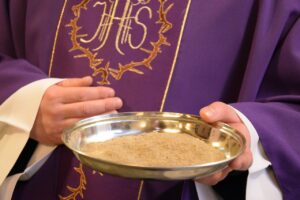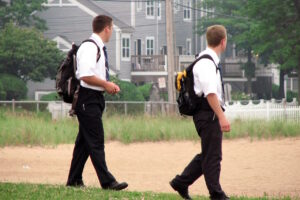Isaiah 5: 1-7; Psalm 80; Philippians 4: 6-9 (RM) or 3:4b-14 (RCL); Matthew 21: 33-43 (RM) or 33-46 (RCL).
Allegory: an exercise in interpretation that may well leave you wondering, Is that what it’s supposed to mean?
An allegorical interpretation means that you pick the individual story elements apart, then assign each one a particular significance such that, taken together, they apply the story to something quite different. A = X, B = Y, C = Z and so on until another story consisting of XYZ emerges.
The story Jesus tells in our Gospel reading for today is just dripping with allegory. But there’s a surface allegory (what it looks like the story is saying, at first glance) and a deeper level.
Here is another case where a story or saying attributed to Jesus in one of the Gospels only makes sense when we remember that the Gospels were put in their final written form two or three generations after the lifetime of Jesus of Nazareth. The Gospel writers used written and oral source material but shaped the story according to their perceptions of what their communities needed to remember from the life and teaching of Jesus — and that had to do with the immediate challenges that the communities faced in their own time.
There are some elements in this parable that scholars believe do go back to an authentic story told by Jesus. Absentee landlords, for example, were common in Galilee at this time. Landowners might set up a business such as a vineyard, then return to their own country, somewhere in the Roman Empire, depending on the local management to run the business and make it turn a profit, part of which accrued to the landowner and was paid to his representatives.
But this Gospel story takes a dark turn as the local tenants abuse, even kill (!) the landowner’s agents who come to collect. More shockingly, when he sends his son to deal with the tenants’ refusal to pay, the tenants calculate that they can keep the vineyard for themselves if they kill the heir.
The conventional interpretation of this story identifies God as the landowner, the tenants as the evil Temple leaders, the servants as the prophets who were rejected, and Jesus as the son (which would mean that Jesus is predicting his own death.) This would illustrate a certain interpretation of salvation history that took shape after, not before, the death and resurrection of Jesus.
Matthew was writing for communities consisting largely of Jews who had become Christians, as well as some Gentiles. The Jewish members had already been ejected from their synagogues for their allegiance to Christ as the Messiah. For this reason the Christian community was known in Greek as ekklesia, from “ek-kaleo,” those who have been called out – called out of the synagogue, that is. Because of their adherence to the Christian faith, they could never “go home” again.
We know that Jesus denounced corruption, collusion and financial exploitation in the strongest terms – think of his rage at the commerce carried out in the Temple precincts. Jesus regularly conflicted with the religious leadership of his time, as his later followers would conflict with their synagogues after the fall of Jerusalem and the destruction of the Temple. In both cases, the new struggled to supplant the old. The Gospel contradicted business as usual. The people entered into a very new relationship with God that was incompatible with the old.
As Scripture scholar Sharon H. Ringe notes, the focus of this story
“is rather on the futility of debates about, and maintenance programs for, the institutions of this age… This puzzling parable pulls us forward toward that unknown future.”
Perhaps these, then, are the leading questions for us today:
What in the church should be maintained?
And, what should be let go of?
© Susan K. Roll
This Reflection has been adapted from the Reflection for October 4, 2020.
* https://npr.org/programs/morning-edition/ for September 25, 2023. “Iran faces pressure for its treatment of women. The president’s wife defends it.”
Susan Roll retired from the Faculty of Theology at Saint Paul University, Ottawa, in 2018, where she served as Director of the Sophia Research Centre. Her research and publications are centred in the fields of liturgy, sacraments, and feminist theology. She holds a Ph.D. from the Catholic University of Leuven (Louvain), Belgium, and has been involved with international academic societies in liturgy and theology, as well as university chaplaincy, Indigenous ministry and church reform projects.





Susan, I don’t respond every time but I so appreciate your reflections; I read and pray with them often. In this reflection your closing questions to the church are quite stunning! I trust you have brought them with you to Rome for the Synod?! Thank you for being part of the extra-mural activities there, full of the Spirit.